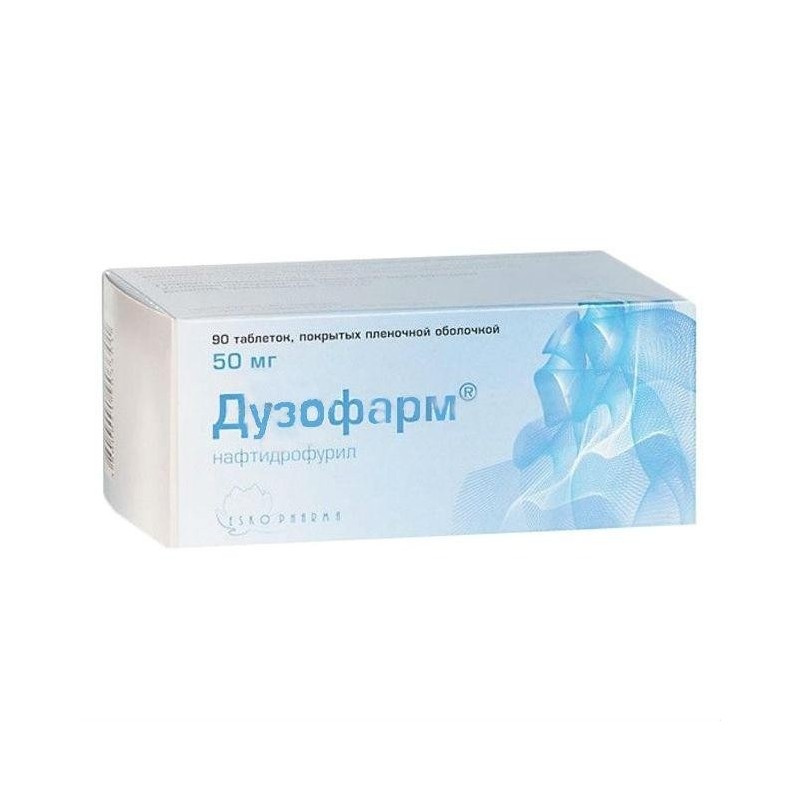



Dusopharm has a vasodilating effect, as a result of which it improves peripheral and cerebral circulation. It causes a decrease in peripheral vascular resistance and increases the minute volume of the heart, without having a significant effect on heart rate and blood pressure. The vasodilating effect of Dusopharm is the result of its direct myotropic, antagonistic to serotonin 5HT2 receptors and alpha adreno-blocking action. It has an M-holinoblokiruyuschee effect. It has a positive effect on cellular metabolism, improving the utilization of oxygen and glucose. This action of the drug is due to its ability to increase ATP levels and inhibit the enzyme succinate dehydrogenase. It activates glucose utilization through the citric acid cycle and increases the conversion of succinic acid to fumaric acid. As a result, the resistance of cells (including the brain) to hypoxia increases. In addition, Dusopharm reduces increased blood viscosity.
The recovery period of cerebral circulation disorders; peripheral circulatory disorders (intermittent claudication, Raynaud's disease, trophic ulcers).
1 tablet contains: Active ingredient: naphthidrofuryl oxalate - 50 mg. Excipients: lactose monohydrate; microcrystalline cellulose; wheat starch; copovidone; colloidal silicon dioxide; magnesium stearate; talc. Shell composition: titanium dioxide; talc; magnesium stearate; macrogol 6000; methacrylic acid and ethyl acrylate copolymer; dye sunny sunset yellow E110.
No customer reviews for the moment.
For oral use. pills are taken whole, with enough liquid (it is recommended to drink water). In violation of cerebral circulation: a daily dose of 300 mg (2 pills 3 times a day). In case of violations of the peripheral circulation: daily doses - 500-600 mg, divided into 3 doses. Dusopharm is recommended for long-term oral therapy (up to 6 months). Dose adjustment for renal / hepatic failure is not required.
When taken orally in doses of 300 to 600 mg, Dusopharm is well tolerated as a whole. Possible side effects: nausea, vomiting, pain in the epigastric region, intestinal colic, diarrhea, loss of appetite, headache, dizziness, sleep disturbance, reversible increase in liver enzymes, gastric mucosa, allergic reactions.
Increased individual sensitivity to the drug. Myocardial infarction (acute stage). Hypotension. Hemorrhagic stroke (acute stage). Epilepsy, increased convulsive readiness. Chronic heart failure stage II – III (NYHA stage III – IV - functional classification of heart failure in the New York Heart Association). Tachyarrhythmias. Age up to 18 years (efficacy and safety have not been established). With care: angle-closure glaucoma; prostatic hyperplasia.
Strengthens the hypotensive effect of antihypertensive drugs. In this regard, it is recommended more frequent control of blood pressure at the beginning of the combined treatment with Dusopharm and antihypertensive drugs at the same time.
Dusopharm does not have a teratogenic effect, but since special studies of its safety in pregnant women have not been conducted, it is recommended to prescribe the drug only in cases where the use of treatment for the mother outweighs the potential risk to the fetus. It is not recommended to take the drug during breastfeeding.
Symptoms: increased severity of side effects, ventricular arrhythmia, anxiety, low blood pressure, bradycardia. Treatment: gastric lavage, the appointment of Activated charcoal and laxatives, symptomatic treatment. There is no specific antidote.
Studies and clinical trials of Naftidrofuryl (Click to expand)